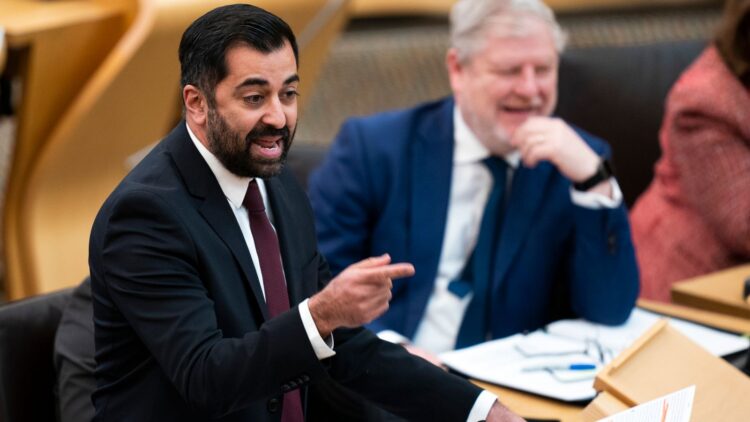By Tony O’Reilly-
Scotland’s first minister, Humza Yousaf,(pictured) has clarified its new hate crime laws during First Minister’s questions on Thursday.
He was responding to claims from critics from Scottish Tories that the law is dangerous and unworkable.
Scotland’s Hate Crime and Public Order (Scotland) Act, slated to take effect in April, has been the subject of intense debate and misinformation, according to remarks made by First Minister Humza Yousaf during a recent session of First Minister’s Questions.
The legislation, passed by MSPs in 2021, introduces a new offence of stirring up hatred based on protected characteristics, mirroring similar laws already in place regarding racial hatred. While the intent behind the law is to combat hate crimes, concerns have been raised about its potential impact on free speech.
Recent reports suggesting that performers could be targeted under the Act based on police training have further fuelled controversy.
Responding to these concerns, Yousaf emphasized the need to distinguish between facts and misinformation surrounding the legislation, urging for clarity on its provisions.
The First Minister highlighted that stirring up hatred offences are not new in Scotland, pointing out existing protections against racial hatred dating back to 1986.
He stressed the necessity of extending similar protections to other marginalized groups based on characteristics like sexuality, disability, or religion.
Yousaf reassured that there exists a “very high threshold” for prosecution under the Act, aiming to balance the imperative to combat hate crimes with the preservation of freedom of expression.
Earlier in the week, reports emerged the police could target performers under the act, based on training undertaken by officers.
Speaking during First Minister’s Questions on Thursday, Humza Yousaf said: “There has been a lot of disinformation that has been spread on social media and some inaccurate media reporting, and indeed by our political opponents, so I’m hoping in this exchange we can shed more light than heat on what is actually in the act as opposed to what is being said about it.”
Mr Yousaf said similar laws were “nothing new in Scotland”, adding: “If I have the protection against somebody stirring up hatred because of my race – and that has been the case since 1986 – why on earth should these protections not exist for someone because of their sexuality, or disability, or their religion?”
The first minister added there was a “very high threshold” to be met for prosecution.
He went on to argue there was a “triple lock” in the act to preserve freedom of expression.
He said that the freedom to criticise, insult and offend “exists and should be treasured”, while he added that he had “full confidence” in police to look beyond “vexatious” claims.
Opposition to the legislation was voiced by Scottish Tory leader Douglas Ross, who expressed concerns about its impact on free speech and its potential diversion of police resources from addressing other crimes.
He criticized the government’s approach, alleging a reduction in officer numbers while introducing new laws, thus straining the capacity of law enforcement.
In response, Yousaf defended the Act, citing safeguards embedded within it to protect freedom of expression.
He refuted claims of declining police numbers, asserting that officer numbers have increased since the SNP took office, although acknowledging a decrease since the formation of Police Scotland.
Addressing concerns about police readiness to enforce the legislation, Chief Constable Jo Farrell affirmed that officers are being trained to apply the law judiciously, taking into account individual rights and freedoms.
She emphasized the importance of striking a balance between combating hate crimes and safeguarding freedom of expression, with measures in place to ensure quality assurance and support for officers.




